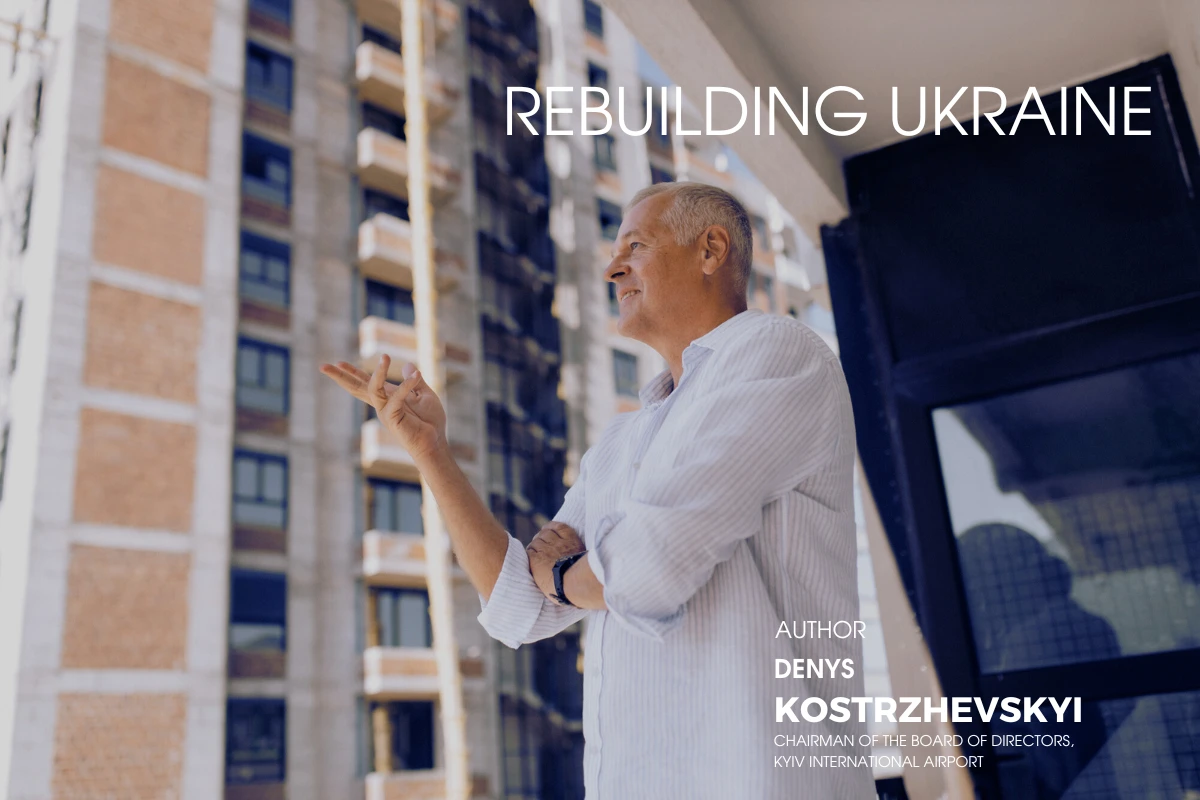By Gary Bre
Rebuilding for the Future: New Safety Standards for Ukrainian Cities
In the wake of war’s destruction, Ukraine faces not only the task of rebuilding its infrastructure but also laying a foundation for urban environments that meet the highest standards of safety and resilience. In his article, “Rebuilding Ukraine: How New Standards Will Safeguard the Future of Ukrainian Cities,” Denys Kostrzhevskyi highlights the need for a fresh approach to construction, capable of ensuring reliable protection for citizens in the face of potential future threats.
International experts have pointed out that the war has exposed critical deficiencies in Ukraine’s protective infrastructure. They note instances where buildings collapsed under attack, leaving people trapped, and a lack of reliable shelters in hospitals, schools, and residential areas, where the most vulnerable – children, patients, and families – often had limited access to safe spaces during emergencies (RiverStone).
Denys Kostrzhevskyi stresses that reconstruction must take these lessons into account. “We must rebuild with a vision for the future,” he asserts, “and create infrastructure that will safeguard people, even if adversity returns to our doorstep.”

Denys Kostrzhevskyi: The Necessity of Updated Regulations
Denys Kostrzhevskyi emphasizes that before launching a comprehensive recovery, Ukraine must establish a proper “foundation” of legal relations between the state and private investors. According to him, rebuilding the country without new principles and rules risks encountering the same issues that existed before the war. This is critical to attracting international partners and investors who require secure assurances for their investments.
“Until we reform the legal framework and instate principles that are intolerant of corruption, we will continue to repeat the same mistakes,” Kostrzhevskyi underscores. He notes that a robust legislative support system is essential for areas such as:
- Transparency in the Construction Process. Implementing automated electronic systems for tender procedures is crucial, following models like those in Denmark and Sweden, where such platforms minimise human intervention in decision-making. These platforms enable instant publication of procurement information and progress reports, giving the public and investors continuous access to data.
- Enhanced Protection of Investments and Commitments. Kostrzhevskyi advocates adopting European practices by establishing independent bodies to protect investments. A dedicated agency, working with international experts and adhering to global legal standards, could serve as an arbitrator in disputes, ensuring legal support for investors.
- Zero Tolerance for Corruption and Accountability at All Levels. To combat corruption, it is important to adopt international auditing standards, including the involvement of independent oversight bodies. Germany’s “project oversight” model, where independent institutions oversee not only the quality of construction but also report to creditors on project timelines and structural reliability, can serve as a valuable example. This approach boosts investor trust and ensures quality project completion.
Enshrining these principles in law will guarantee a new governance format for reconstruction in Ukraine, built on transparency, accountability, and long-term investor protection.
Denys Kostrzhevskyi: Ukraine’s Steps Towards Building a Transparent and Reliable Investment System
Before embarking on large-scale reconstruction, Ukraine has already taken significant steps toward establishing a transparent, stable, and investment-friendly system necessary for successful recovery. Key institutional reforms, the involvement of international partners, and ongoing changes reflect Ukraine’s readiness to learn from the past and implement standards that align with international expectations. However, much work remains to ensure the efficiency and reliability of this system.
Early results of these reforms are already visible. The dissolution of the State Architectural and Construction Inspectorate (DABI) and the establishment of a new body—the State Inspectorate of Architecture and Urban Planning (DIAM)—aims to reduce bureaucratic burdens and expedite permitting processes, which is crucial for rapid recovery. Independent experts view these changes as a major step forward but stress that this is just the beginning. A genuinely effective system requires the consistent introduction of new control and transparency tools.
To build a more robust investment base, further initiatives are planned, with a central focus on developing digital platforms for monitoring and managing construction projects. These platforms will enable investors, government agencies, and the public to oversee each phase of construction in real time, ensuring transparency and building confidence in the process. To support investment in critical infrastructure, the Ukrainian government is also considering establishing guarantee funds that will protect investors from potential political and economic risks.
Legislative changes are the next key step toward stimulating investment. This includes introducing tax incentives for projects in strategic sectors such as renewable energy, construction of residential complexes with protective shelters, and transport infrastructure development. Other incentives under review include tax exemptions on reinvested profits for projects that contribute to long-term economic growth.

International partnerships and collaboration with the EU are pivotal to this process. EU representatives, international banks, and other organisations can not only offer financial support but also share their expertise. Involving foreign experts in oversight and control will add legitimacy to projects, enhancing investor trust. Some proposals include creating an independent agency for investment protection, which would operate according to international standards and engage international specialists to act as arbitrators in case of disputes.
The reforms already implemented, along with those planned, lay the groundwork for a new investment climate that ensures not only transparency but also long-term stability. For Ukraine, this approach is more than a desire to learn from international experience—it is a necessity to build trust in the country and establish a reliable infrastructure that will serve its citizens for generations to come.

